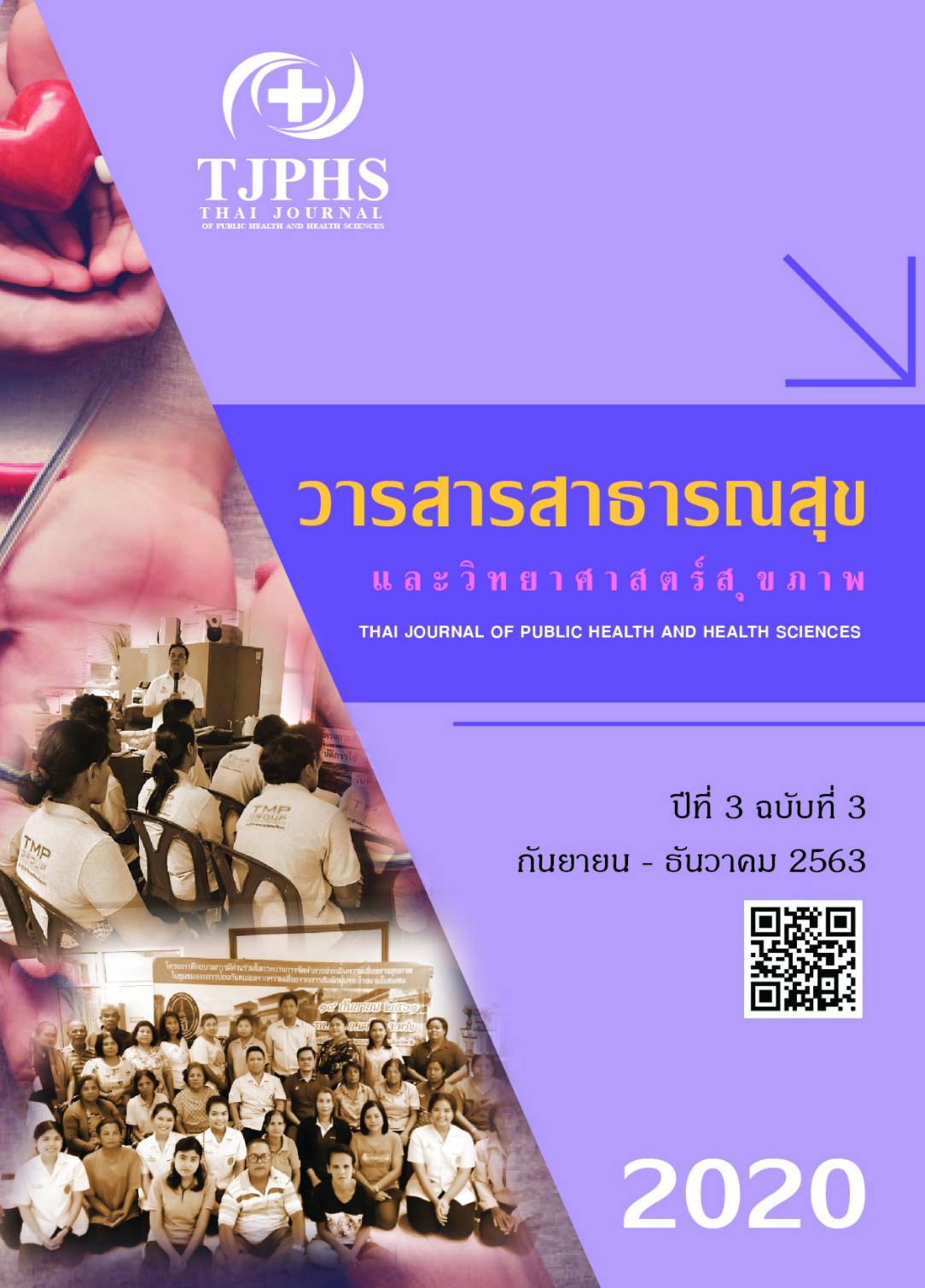ความรู้ ทัศนคติ และพฤติกรรมการดูแลผู้ป่วยในระยะประคับประคองของนักศึกษาพยาบาลศาสตร์ สถาบันพระบรมราชชนก
คำสำคัญ:
ความรู้, ทัศนคติ, นักศึกษาพยาบาล, การดูแลในระยะประคับประคองบทคัดย่อ
การศึกษาเชิงพรรณนานี้มีวัตถุประสงค์เพื่อศึกษาความรู้ ทัศนคติ และพฤติกรรมการดูแลผู้ป่วยในระยะประคับประคองของนักศึกษาพยาบาลศาสตร์ สถาบันพระบรมราชชนก กลุ่มตัวอย่างเป็นนักศึกษาพยาบาลศาสตร์บัณฑิตชั้นปีที่ 3 และ 4 จำนวน 299 คน ที่ทำการสุ่มแบบพื้นที่ตามสัดส่วนของจำนวนนักศึกษา เก็บข้อมูลโดยใช้แบบวัดความรู้ ทัศนคติ และพฤติกรรมการดูแลผู้ป่วยในระยะประคับประคองที่มีค่า KR-20 ของแบบวัดความรู้เท่ากับ 0.75 ส่วน Cronbach’alpha ของแบบวัดทัศนคติและพฤติกรรมเท่ากับ 0.79, 0.93 ทดสอบความแตกต่างโดยใช้สถิติ MANOVA
ผลการศึกษาพบว่ากลุ่มตัวอย่างร้อยละ 61 เป็นนักศึกษาชั้นปีที่ 4 ร้อยละ 61 มีประสบการณ์ในการรับการอบรมในดูแลผู้ป่วยในระยะประคับประคอง และ ร้อยละ 62 มีประสบการณ์ในการดูแลผู้ป่วยในระยะประคับประคอง ค่าเฉลี่ยของคะแนนความรู้ ทัศนคติ และพฤติกรรมการดูแลผู้ป่วยในระยะประคับประคองอยู่ในระดับปานกลาง โดยนักศึกษาพยาบาลศาสตร์ชั้นปีที่ 4 มีค่าคะแนนเฉลี่ยสูงกว่านักศึกษาพยาบาลศาสตร์ชั้นปีที่ 3 และนักศึกษาพยาบาลศาสตร์ที่มีประสบการณ์ในการดูแลผู้ป่วยในระยะประคับประคองมีค่าคะแนนเฉลี่ยสูงกว่านักศึกษาที่ไม่มีประสบการณ์ เมื่อทดสอบด้วยสถิติพบว่านักศึกษาที่มีประสบการณ์จะมีค่าคะแนนเฉลี่ยของความรู้ด้านการการดูแลผู้ป่วยในระยะประคับประคองแตกต่างจากผู้ที่ไม่มีประสบการณ์อย่างมีนัยสำคัญทางสถิติ (F=5.73, df = 1, p=0.018) ดังนั้นควรจัดการอบรมหรือจัดหลักสูตรเพื่อส่งเสริมให้นักศึกษาพยาบาลศาสตร์บัณฑิตมีความรู้ ทัศนคติและพฤติกรรมในการดูแลผู้ป่วยในระยะประคับประคอง
เอกสารอ้างอิง
Abu Hasheesh, M. O., Al-Sayed AboZeid, S., Goda El-Said, S., Alhujaili, A. D. (2013). Nurses' characteristics and their attitudes toward death and caring for dying patients in a public hospital in Jordan. Health Science Journal, 7: 384-394.
Akarathanarak, T. Kongsuwan, W. & Matchim, Y. (2014). New registered nurses’ knowledge in caring for patients at the end of life, Songklanagarind Journal of Nursing, 34:103-116.
Al Qadire M. (2014). Knowledge of palliative care: An online survey. Nurse Educ Today, 34: 714-718.
American Association of Colleges of Nursing. CARES: (2018). Competencies and Recommendations for Educating Undergraduate Nursing Students Preparing https://www.aacnnursing.org/Portals/42/ELNEC/PDF/New-Palliative-Care Competencies.pdf?ver=2017-07-27-151036-973. [Last accessed on 22 Jan 2018]
Ayed A, Sayej S, Harazneh L, Fashafsheh I, Eqtait F. (2015). The nurses' knowledge and attitudes towards the palliative care, J Nurs Educ Pract, 6:91-99.
Das, A.G, Haseena, T. A. (2015). Knowledge and Attitude of Staff Nurses Regarding.Palliative Care. Int J Sci Res, 4:1790-94.
Doorenbos, A. Z., Juntasopeepun, P., Eaton, L. H., Rue, T., Hong, E., Coenen, A. (2013). Palliative Care Nursing Interventions in Thailand. J Transcult Nurs, 24:332- 39.
Ferrell, B., Malloy, P., Virani, R. (2015). The end of life nursing education nursing consortium project. Ann Palliat Med, 4: 61-69.
Grubb, C., Arthur. (2016). A.Student nurses' expereince of and attitudes towards care of the dying: A cross-sectional study. Palliat Med, 30:83-88.
Hanprasitkam, K., Patoomwan, A., Churaitatsanee, S., & Paisansuthideth, U. (2011). The Effect of an End-of-Life Care Education Program on Nurses’ Knowledge, Attitude, and Practice in Caring for End-of-Life Patients. Rama Nurs J, 17: 126-140.
Harazneh, L., Ayed, A., Fashafsheh, I., & El-Nasser Ali, G.A. (2015). Knowledge of palliative care among bachelors nursing students. JHMN, 18: 25-32.
Hermann, C., Head, B.A., Black, K., Singleton, K. (2016). Preparing Nursing Students for Interprofessional Practice: The Interdisciplinary Curriculum for Oncology Palliative Care Education. J Prof Nurs, 32:62-71.
Hfocus. (2016). The Ministry of Public Health set a goal to extend the palliative care in 300 community hospitals liking with 30,000 family care doctor teams in September. Available from: https://www.hfocus.org/content/2015/03/9603. [Last accessed on 20 Jan 2016]
Karkada, S., Nayak, B.S., & Malathi. (2011). Awareness of palliative care among diploma nursing students. Indian J Palliat Care, 17: 20–23.
Kassa, H., Murugan, R., Zewdu, F., Hailu, M., & Woldeyohannes, D. (2014). Assessment of knowledge, attitude and practice and associated factors towards palliative care among nurses working in selected hospitals, Addis Ababa, Ethiopia. BMC Palliative Care, 16: 1-11.
Keawtong, W., Rawiworakul, T., Kalampakorn, S. Kerdmongkol, P. (2017). Competencies of Palliative Care Among Community Nurses In Primary Care Units. JRTAN, 18:74-83.
Kwekkeboom, K. L. Vahl, C.,MS, Eland, J. (2005). Companionship and Education: A Nursing Student Experience in Palliative Care. J Nurs Educ, 44:169-76.
Lange, M., Thom, B., Kline, N. F. (2008). Assessing nurses' attitudes toward death and caring for dying patients in a comprehensive cancer center. Oncol Nurs Forum; 35: 955-959.
Manosilapakorn, C. (2003). Thai nurses' attitudes, knowledge, ethical dilemmas, and clinicaljudgment related to end-of-life care in Thailand. Unpublished dissertation. George Mason University.
Mollory, J.L. (2003). The impact of a palliative care educational component on attitudes toward care of the dying in undergraduate nursing students. J Prof Nurs, 19:305-12.
Nantsupawat, R., Kunaviktikul, W., Keitlertnapha, P., Abhicharttibutra, K, & Srisuphan, W. (2008). Nursing and Midwifery Workforce Planning Among Nursing Educational Institutions in Thailand. Journal of Thai Nursing Council, 23:41-55.
Prem, V. et al. (2012). Study of Nurses’ Knowledge about Palliative Care: A Quantitative Cross-sectional Survey. Indian J Palliat Care, 18: 122–127.
Rongmuang, D., Nakchattree, C., Thongphet, P. (2018). Palliative and End-of-life Car Competencies among Registered Nurses in Regional Health 11. JRTAN, 19: 412-22.
Ross, M., McDonald, B. & McGumness, J. (1996). The palliative care quiz for nursing (PCQN): the development of an instrument to measure nurses' knowledge of palliative care. J Adv Nurs, 23:126-137.
Shea, J. Grossman, S. Wallace, Lange, J. (2010). Assessment of Advanced Practice Palliative care Nursing competencies in Nurse Practitioner students: Implications for the Integration of ELNEC Curricular Modules. J Nurs Educ,49: 183-189.
Singweratham, N & Kantabanlang, Y. (2017). Current health workforce and state of health workforce development needs in Thai health system: a report by the Phraboromarajchanok Institute (PBRI), the Ministry of Public Health (MOPH). The Southern College Network Journal of Nursing and Public Health, 4(3): 218-225.
Sirisoongnern, J., Phimphisutiphong, M, Phakdeekul, W. (2018). Palliative and end of life care model in Khon Kaen Province. Community Health Development Quarterly Khonkaen University, 6: 318-335.
World Health Organization. (2019). Palliative care: Key Facts. World Health Organization. Available from: https://www.who.int/news-room/fact-sheets/detail/palliative-care/[Last accessed on 26 Jan 2019]
ดาวน์โหลด
เผยแพร่แล้ว
รูปแบบการอ้างอิง
ฉบับ
ประเภทบทความ
สัญญาอนุญาต
บทความทุกบทความที่ได้รับการตีพิมพ์ถือเป็นลิขสิทธิ์ของ วารสารสาธารณสุข
















